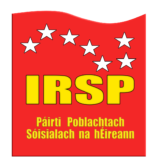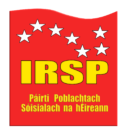In the context of an onslaught on working class people involving a consensus for cuts among the establishment parties in a failing attempt to deal with capitalism’s latest collapse, a health service in crisis, continued unemployment and mass emigration particularly among young people, elements of the Irish left came together to form the ‘United Left Alliance’. The Irish Republican Socialist Party wishes to now put on record it’s position on the ULA. A core tenet of IRSP policy since our foundation, in the pursuit of our objective of a 32 County Democratic Socialist Republic, has been the formation of a Broad Front to combat the malign influences of imperialism and capitalism in Ireland as effectively as possible. The creation of such a front would in effect see the development of a unified struggle against all the baneful manifestations of capitalism and would begin the process of creating a mass revolutionary party (consistent calls for such a party have been made from some quarters of the Irish left, these are calls we would like to echo) capable of offering leadership and mobilising as many people as possible towards our goals. Unity and co-operation amongst the left has consistently been a facet of IRSP policy.
Two questions arise for the IRSP out of the formation of the ULA, the ideological question and the tactical question. Ideologically speaking, while the IRSP is not in full agreement with the programme of the ULA, we view it as also containing ideas of substantial merit. However, a major failing is that the programme itself, while mentioning several components of a socialist system, fails to explicitly state that it is the programme of an organisation which seeks to establish a revolutionary socialist state in Ireland. One can only speculate as to the reason for this, most probably fears about alienation of the mass of working people and potential constituent members, but this is something we fundamentally disagree with. There must be no ambiguity among socialists about what we stand for and this point leads us on to the tactical question which will be developed below. Also notable by it’s absence is any mention of the national aspect to the revolutionary socialist struggle in this country. It is the duty of Irish socialists to combat the undemocratic imposition of cutbacks in the North, challenge the overt sectarianism which has been entrenched in the very structures of the Northern state and work towards the ending of partition.
This latest crisis must not be met with a strategy based around electoral gains, such a strategy is akin to inviting failure to our doorstep. The biggest flaw with the ULA is that such a coalition is aimed at winning elections, not building the working class mass fightback or pointing the way towards workers’ power. This is one of the most fundamental issues that divides revolutionary socialists from reformist social democrats. It is the capacity of the working class for action that is most vital in changing society, not winning votes.
The IRSP’s position on electoralism is clear. We do not believe there is a parliamentary road to socialism and thus any electoral intervention must not be characterised by a refusal to put right-wing parties in power or the demand for what can realistically be judged as a more progressive policy platform than a conservative administration, but by the clear pursuit of revolutionary aims. Central to our revolutionary aims is the building of working class power, which will not be built by uniting a couple of sects espousing reformist rhetoric and reformist demands. The current system of political administration in Ireland, a reflection of our economic system, is fundamentally undemocratic and cannot possibly cater for the needs of the Irish people. Any electoral success must be used to spread revolutionary socialist ideas and to expose the stark limitations of the current system. Most especially this must be channeled towards mobilising working people to the streets, not demobilising them, or putting them under the influence of trade union bureaucrat mis-leaders. As Ta Power said, “There is no easy way to the Socialist Republic, no shortcuts”, and yet some far left parties have a foolish history of ditching much of their core political principles for short-term electoral gains.
During the crisis, all efforts must be made to correctly identify and articulate the true causes of the economic collapse, namely, the inherent contradictions at the heart of the capitalist system. Populism around individuals and popular media scapegoats may be useful in garnering some minor electoral support, but does little to properly educate or radicalise working people. Concentrating on the symptoms of Ireland’s economic forms rather than widening the confines of political discourse in Ireland and directly outlining the inherent flaws in capitalism and that we see socialism as the solution, is a road to nowhere. Leading on from the ideological decision to neglect to mention socialism in their programme, the strategy of the ULA will naturally also mirror this tepidness.
We recognise this is a minimum programme and each constituent member may pursue their own strategy, but that calls into question the whole premise of the ULA. Should socialists sign up to something that in practice would be reformist and firmly in the realms of social democracy? The answer should be an unequivocal ‘no’. This returns usto the issue of how this alliance is being built: not by the broader layers of working masses, but by two main sects out to enlarge their vote.
Having said this, if the intention behind this formation is to simply begin negotiations and set in place the foundations for what would be a mass revolutionary party which is unambiguous about it’s socialist revolutionary credentials, then it must be wholeheartedly welcomed. Integral to this must be broad-based talks that include all organizations of the revolutionary left, including those who recognise the importance of the national question.
The position of the IRSP at this juncture is that while the formation of the ULA is progressive in our view, with many outstanding local activists involved, the IRSP’s revolutionary outlook in relation to the subject of electoralism and the struggle for Irish sovereignty do not run parallel to the views of the ULA. In a personal capacity members of the IRSP may aid ULA campaigns in their locality but we hope at some point in the near future to take part in the building of a mass revolutionary party that unashamedly stands in the tradition of James Connolly and socialist republicanism and which will work towards the ending of exploitation, capitalism and imperialist occupation. The interests of individual sects must be put aside in the interests of working people and to this end we envisage the establishment of a mass revolutionary organisation as the only vehicle through which our goals can be achieved.
Ends.

